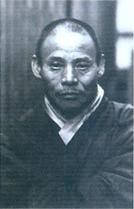Han Yong-un
|
|
|
| Korean spelling | |
|---|---|
| Hangeul | 한용운 (한유 천) |
| Hanja | 韓龍雲 |
|
Revised Romanization |
Han Yong-un |
|
McCune- Reischauer |
Han Yongun |
Han Yong-un also known by his Buddhist name Manhae (Kor. 만해 Hanja 萬 海 or 卍 海 ) (born August 29, 1879 in Hongsŏng , South Ch'ungch'ŏn Province; † June 29, 1944 in Seoul ) was a Korean lyric poet , political activist, and reformist of modern Buddhism.
Life
Han Yong-un (born Han Yu-ch'ŏn; kor. 한유 천 ) learned the Chinese classics as a child in a Confucian village school (Sŏdang) and turned to the spiritual life at a young age. At the age of 26 he entered the Buddhist monastic order of the Paektam temple, where he studied both Buddhist texts and modern philosophy and led an ascetic existence.
Han, who saw Korea become a Japanese colony , worked actively for his country's independence throughout his life. From 1918 Han published the magazine Yusim , which conveyed the idea of nonviolent resistance and was supposed to inspire the people for independence.
Han is one of the representatives of the Declaration of Independence that was proclaimed in the March 1 , 1919 Movement . After the protests against the Japanese colonial government, he was arrested and given a seven-year prison term. After three years he was released. Despite oppression from the colonial government, he continued to play an important role in various civil movements, Buddhist movements and alliances.
Han Yong-un campaigned for reforms in Korean Buddhism throughout his life. His works On the Revitalization of Korean Buddhism ( 조선 불교 유신론 ) (1913) and Draft for the Reform of Korean Buddhism (조선 불교 의 개혁안) (1931) deal with specific proposals such as: B. a central organization of Buddhism and emphasize the need for popular Buddhism for the Korean mind.
Han wrote numerous poems in Chinese and Korean. One of his most famous poems is The Silence of the Beloved ( 님 의 침묵 ). Most of the time, the poem was interpreted to mean that the beloved is not a specific person, but the fatherland. Han Young-un spent the last ten years of his life in Seoul, where he died in 1944.
The Manhae Literature Prize named after him has been awarded since 1974 .
Work (excerpt)
Korean
- 조선 불교 유신론 On the revitalization of Korean Buddhism (1913)
- 조선 불교 의 개혁안 Draft for the Reform of Korean Buddhism (1931)
- 흑풍 Black Wind (1935)
- 후회 repentance (1936)
- 박명 disfavour of Fate (1938)
Translations
German
- Wind and grass. 현대 시선 <바람 과 풀> dtv 1991. ISBN 978-3926602091
- The silence of the beloved. Horlemann 2001. ISBN 978-3895021350
English
- The Silence of Love Prairie Poet Books (1984)
- Contemporary Korean Poetry Mosaic (1994) ISBN 978-0889625617
- Love's Silence & other Poems Ronsdale Press (1999) ISBN 978-0921870623
- Looking for the Cow DEDALUS (1999) ISBN 978-1901233513
- Everything Yearned For: Manhae's Poems of Love and Longing Wisdom Publications (2005) 978-0861714896
- Selected Writings of Han Yongun BRILL / Global Oriental (2008) ISBN 978-1905246472
French
- Le silence de Nim Autres Temps (1996)
Awards
- 1962 - National Order of Merit of the Republic of Korea
Individual evidence
- ↑ KBS World : Han Yong-un Cries out for National Independence in “The Silence of My Love” from July 11, 2013, accessed on August 14, 2013 (English).
- ↑ KBS World Buddhist Reformer and Resistance Poet, Manhae Han Yong-un , accessed on August 14, 2013 (English).
- ↑ Kwang Sik Kim: A Study of Han Yong-un's On the Reform of Korean Buddhism . In: Korean Journal Volume 45, No. 1, 2005, p. 85.
- ↑ LTI Korea: Author Database: Han Yong-un ( Memento of the original from March 24, 2014 in the Internet Archive ) Info: The archive link was inserted automatically and has not yet been checked. Please check the original and archive link according to the instructions and then remove this notice. , accessed on August 14, 2013.
- ^ The Manhae Prize for Literature . Changbi Publishers. Retrieved November 7, 2013.
| personal data | |
|---|---|
| SURNAME | Han, Yong-un |
| ALTERNATIVE NAMES | 한용운 (Korean, Hangeul); 韓龍雲 (Korean, Hanja); Han, Yongun (McCune-Reischauer) |
| BRIEF DESCRIPTION | Korean author |
| DATE OF BIRTH | August 29, 1879 |
| PLACE OF BIRTH | Hongsŏng , South Ch'ungch'ŏn |
| DATE OF DEATH | June 29, 1944 |
| Place of death | Seoul |
